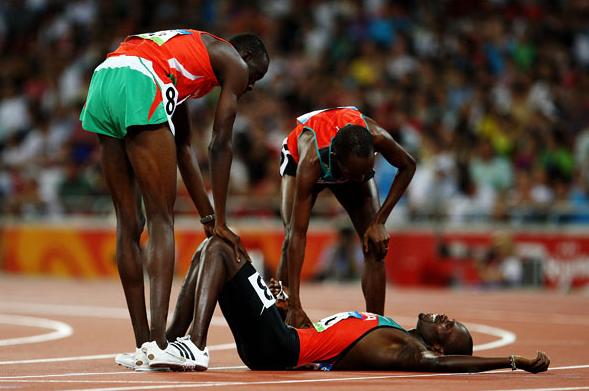 Are You Running Yourself To An Early Grave?
Are You Running Yourself To An Early Grave?
For those of you who think running around all day is a great way to
boost your cardiovascular health, think again. While there’s no denying
running a marathon is to strengthen your cardiovascular system and
extend your life, some high-risk runners who are unaware of any
pre-existing heart conditions could actually be putting themselves at
risk.

So what’s an eager runner to do? Here’s what you need to know so you make it across the finish line without running out of steam:

So what’s an eager runner to do? Here’s what you need to know so you make it across the finish line without running out of steam:
Check in with a cardiologist. Consider your risk factors: Are you overweight or obese? How are your cholesterol levels, triglycerides, and blood pressure? Feeling excessive chest pains or shortness of breath while you jog? If any of that applies to you, then you might need to undergo a exercise stress test, which is where they slowly increase your pace on a treadmill in a controlled setting to see how much strain your heart can handle.
Examine your family tree. Check for all ailments, particularly undiagnosed hypertrophic cardiomyopathy. This is a genetic condition that enlarges part of your heart muscle, upsetting the delicate electrical impulses that keep your heart beating a steady rhythm. Look for any cases of sudden death or heart attacks in relatives younger than 50. One way to find out is through a resting electrocardiogram (ECG) or an echocardiogram (like a sonogram of your heart).
Race like you train. Research has found that the most deadly part of a race is in the last quarter. When people smell the finish line, they start to push themselves extra hard, and that additional effort is what triggers their heart attack. So only run the race that you've trained yourself for.
Learn CPR. According to the study, runners who survived their heart attack received CPR within an average of 90 seconds, while people who died waited around 5 minutes for potentially life-saving chest compressions. Get your running mates to join you in signing up for a CPR course, this will greater your chances of saving your life during the next race.
Examine your family tree. Check for all ailments, particularly undiagnosed hypertrophic cardiomyopathy. This is a genetic condition that enlarges part of your heart muscle, upsetting the delicate electrical impulses that keep your heart beating a steady rhythm. Look for any cases of sudden death or heart attacks in relatives younger than 50. One way to find out is through a resting electrocardiogram (ECG) or an echocardiogram (like a sonogram of your heart).
Race like you train. Research has found that the most deadly part of a race is in the last quarter. When people smell the finish line, they start to push themselves extra hard, and that additional effort is what triggers their heart attack. So only run the race that you've trained yourself for.
Learn CPR. According to the study, runners who survived their heart attack received CPR within an average of 90 seconds, while people who died waited around 5 minutes for potentially life-saving chest compressions. Get your running mates to join you in signing up for a CPR course, this will greater your chances of saving your life during the next race.






